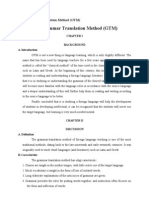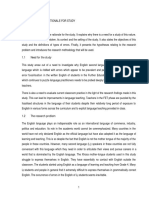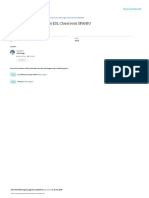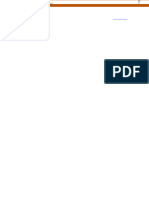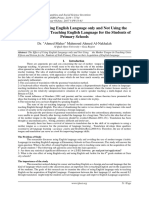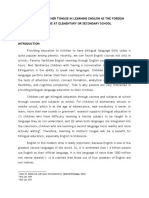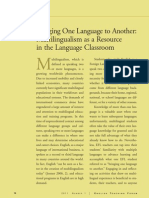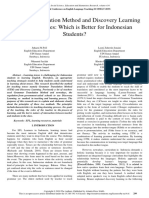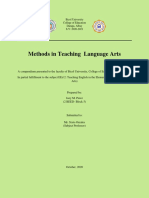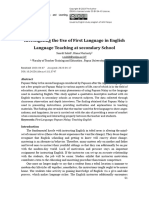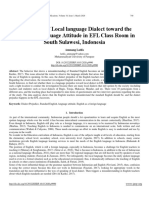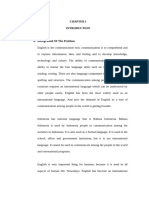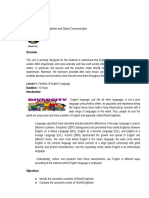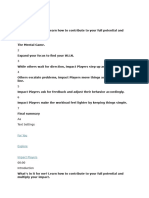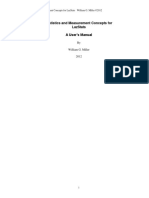0 ratings0% found this document useful (0 votes)
2 views3539
3539
Uploaded by
shaniabaiCopyright:
© All Rights Reserved
Available Formats
Download as PDF, TXT or read online from Scribd
3539
3539
Uploaded by
shaniabai0 ratings0% found this document useful (0 votes)
2 views3 pagesCopyright
© © All Rights Reserved
Available Formats
PDF, TXT or read online from Scribd
Share this document
Did you find this document useful?
Is this content inappropriate?
Copyright:
© All Rights Reserved
Available Formats
Download as PDF, TXT or read online from Scribd
Download as pdf or txt
0 ratings0% found this document useful (0 votes)
2 views3 pages3539
3539
Uploaded by
shaniabaiCopyright:
© All Rights Reserved
Available Formats
Download as PDF, TXT or read online from Scribd
Download as pdf or txt
You are on page 1of 3
Volume 17| February 2023 ISSN: 2795-739X
The Use of Mother Tongue in English
Classrooms
Diyora Anorboyeva Student of JSPU
742 (20) group
diyoraanorboeva@gamil.com
Khakima Botirova Scientific supervisor
The use of mother tongue in teaching a foreign language is a controversial topic. While
some researchers claim that the mother tongue should not be used in foreign language
classrooms, others think that it makes a valuable contribution to the learning process. In
ABSTRACT
different methods and approaches, the role of mother tongue is different. This article is
aimed at promoting and enhancing the use of English language in EFL classes and at the
same time allowing the mother tongue to be used in particular situations.
Keywords: Mother tongue, First language (L1), Target language
Introduction teachers to understand the errors their students
Language learning is a continuous process. make and to target their lessons to each
That’s why a focus should be given to the student’s individual needs.
learners’ level, age and background and the
teachers’ perceptions to teach the language. If Main Part
the teacher insists on using only the target Mother tongue can often be referred to as your
language in EFL classrooms and ignoring first language or native language. It is the
learners’ background, learners may feel to force language that you most commonly speak.
to use the language and may resent learning. Mother tongue in education refers to when a
Moreover it slows down the pace of the learners school or educational institution integrates the
who are willing to learn and use the language. language a child is most familiar with (their
The role of mother tongue has always been an mother tongue) into the classroom lesson along
important issue in the study of Foreign with the school’s lesson (such as English). This
Language Teaching. is normally the language that the child speaks at
It is a fact that teachers may use the mother home with their family. Today’s trend and
tongue in various situation for different scientific research reveal the fact that the use of
purposes. However, the use of L1 should not be the target language (L2) is essential in EFL
exaggerated because the more the students are classrooms. However, the appropriate use of
exposed to the target language, the better they mother tongue (L1) plays a significant role in
will learn it. In fact, the use of mother tongue the process of teaching and learning a foreign
may contribute to language learning process in language as well. At some levels and
various occasions in the learning-teaching applications the role of learners first language in
process; however, the exercise use of it may the classroom can be seen facilitating. There are
result in too much dependence on it, which less several possible occasions for the usage of the
desired outcome. And also it is important for mother tongue which might be beneficial and
Eurasian Journal of Learning and Academic Teaching www.geniusjournals.org
P a g e | 100
Volume 17| February 2023 ISSN: 2795-739X
time-saving in the whole process of true and why to use L1, that is to say, the proper use
understanding the grammar structures and of L1 who denied that word-for-word and
rules of the foreign language. The mother sentence-for-sentence translation. Many studies
tongue can be used to provide a quick and show that limited use of mother tongue is
accurate translation of an English word that beneficial and over use of it may counter-
might take several minutes for the teacher to productive as it encourages the low exposure in
explain and, even then, there would be no target language. L1 is most useful at beginning
guarantee that the explanation had been and low levels. If students have little or no
understood correctly. It can also be used to knowledge of the target language, L1 can be
clarify a difficult language pattern by providing used to introduce the major differences
with the equivalent in L1. There are some cases between L1 and L2, and the main grammatical
in which the use of students’ mother tongue is characteristics of L2 that they should be aware
allowed in EFL classes. of. Mother tongue is the in-born language, which
Teachers can use students’ mother tongue a baby has already familiarized even in the
when: gestation of mother before it was born. The first
• Translating abstract words like “beauty” language is the language which a child acquires
or “love” either through schooling or socialization, such
• Checking that students knew the as family. The target language is the language
meaning of a word after presenting it. learners are studying, and also the individual
• Explaining a difficult grammar point so items of language that they want to learn, or the
that students can understand how it is teacher wants them to learn. The target
expressed using both the English language is the language being translated into.
language and students’ mother tongue For example, I work from Uzbek to English, so
language. my source language is Uzbek and my target
The similar amount of students stated that using language is English. A classroom situation in
the mother tongue facilities their process of which the target language is used for
learning English. There are also very interesting communication between the teacher and the
findings in replies of the teachers joined the learner, and the between the learners and their
research study. (Schweers 1999) They peers, gives the learner opportunities for
conveyed the following reasons for using the interaction in the target language.
mother tongue during their classes:
➢ To help the students to understand the Conclusion
whole concept The role of mother tongue has always been an
➢ To improve their report writing important issue in the study of foreign language
➢ To create the mutual understanding teaching. The study suggests that through
between the teacher and the students meaningful oral practice in English, using
➢ To show the students the respect and shorter and simpler expressions, short chatting
importance of their native language in English with students, of course, may enhance
The term ‘mother tongue’, ‘first language’ and target language use. The role of mother tongue
‘native language/tongue’ are essentially all the should be restricted to be facilitative,
same though there are some instances when supportive and compensatory in foreign
they mean different things. ‘First Language, language classrooms. Both too much
mother tongue and native tongue are common dependency and total prohibition of the mother
terms for the language which a person acquires tongue should be avoided. Most importantly,
first in his childhood because it is spoken in the teacher should keep speaking English maximize
family and/or it is the language of the country the exposure of students in English language.
where he is living. Therefore, the language that
one first learners to speak when he or she is a
child can be said the first language. Teachers
would be required to be aware of when, how
Eurasian Journal of Learning and Academic Teaching www.geniusjournals.org
P a g e | 101
Volume 17| February 2023 ISSN: 2795-739X
References
1. Atkinson, D. (1987) The mother tongue
in the classroom, ELT Journal.
2. Froukje Brands Using the target
language in the foreign language
classroom
3. J. Harbord, The use of the mother tongue
in the classroom, ELT Journal.
4. W. J. Sweers, Using L1 in the L2
classroom
Eurasian Journal of Learning and Academic Teaching www.geniusjournals.org
P a g e | 102
You might also like
- Topic 6 IB TB Questions and AnswersDocument33 pagesTopic 6 IB TB Questions and Answersgeorgia92% (12)
- Messaging: beyond a lexical approach in ELTFrom EverandMessaging: beyond a lexical approach in ELTRating: 5 out of 5 stars5/5 (1)
- The Grammar Translation MethodDocument14 pagesThe Grammar Translation Methodkeyza_tyas100% (1)
- Chapter IDocument19 pagesChapter IMahlizah LizaNo ratings yet
- Translanguagingasa Language Management Strategyina Multilingual ClassroomDocument8 pagesTranslanguagingasa Language Management Strategyina Multilingual ClassroomAbonalla,Rycha Gaile Marie GarciaNo ratings yet
- 01 DissertationDocument79 pages01 Dissertationshubhioo7No ratings yet
- Using Native Language in ESL Classroom BDocument7 pagesUsing Native Language in ESL Classroom BIsabellaSabhrinaNNo ratings yet
- Raj Khati 2011 PDFDocument10 pagesRaj Khati 2011 PDFJessieRealistaNo ratings yet
- Judiciousness of Mother Tongue Use in EFL Classroom: AbstractDocument8 pagesJudiciousness of Mother Tongue Use in EFL Classroom: AbstractskerellariNo ratings yet
- Mother Tongue Interference Towards Students EngliDocument8 pagesMother Tongue Interference Towards Students EngliLilibethlapathaNo ratings yet
- Readings For EFL TeachersDocument30 pagesReadings For EFL TeachersAtef Abd El-KhalekNo ratings yet
- Ma Tefl ThesisDocument94 pagesMa Tefl ThesisArif JavaidNo ratings yet
- Poor PronounciationDocument8 pagesPoor Pronounciationc nyikadzinoNo ratings yet
- Курсовая Стребкова ТатьянаDocument29 pagesКурсовая Стребкова ТатьянаStrenushNo ratings yet
- 2334-File Utama Naskah-8466-1-10-20140311Document13 pages2334-File Utama Naskah-8466-1-10-20140311Vica HasnaNo ratings yet
- Teaching Speaking - PaperDocument6 pagesTeaching Speaking - PaperMiku HatsuneNo ratings yet
- Jurnal (Improving Students' Vocabulary by Using Show and Tell (S T) MethodDocument7 pagesJurnal (Improving Students' Vocabulary by Using Show and Tell (S T) MethodAnnaskwNo ratings yet
- Ramelan, 1984. Introduction To Linguistics Analysis. Semarang: IKIP Semarang Press. P .3Document6 pagesRamelan, 1984. Introduction To Linguistics Analysis. Semarang: IKIP Semarang Press. P .3Leo Syafviee100% (1)
- 1.2. Background To The StudyDocument34 pages1.2. Background To The StudySaimone Helaque LucasNo ratings yet
- Unit 5 - Teaching of Regional LanguageDocument1 pageUnit 5 - Teaching of Regional LanguageVidhya RamNo ratings yet
- G0606015161 PDFDocument11 pagesG0606015161 PDFinventionjournalsNo ratings yet
- Draft Perbaikan 3Document27 pagesDraft Perbaikan 3Herman Al MahmudiNo ratings yet
- The Role of Mother Tongue in Learning English As The Foreign Language at Elementary or Secondary SchoolDocument6 pagesThe Role of Mother Tongue in Learning English As The Foreign Language at Elementary or Secondary SchoolTsalza ShabrinaNo ratings yet
- 49 1 4 Milambiling-1Document9 pages49 1 4 Milambiling-1Juan Santiago BotelloNo ratings yet
- Capacity Building Series - Ell Voices in The ClassroomDocument8 pagesCapacity Building Series - Ell Voices in The Classroomapi-501283068No ratings yet
- First Language in Foreign Language Classroom Discourse: Is It Necessary?Document10 pagesFirst Language in Foreign Language Classroom Discourse: Is It Necessary?HananNo ratings yet
- The Use of English Subtitle in Movie To Improve Students' Vocabulary: An Experimental Study in Grade Ix of SMPN 1 Gunungsari Academic Year 2015/2016Document6 pagesThe Use of English Subtitle in Movie To Improve Students' Vocabulary: An Experimental Study in Grade Ix of SMPN 1 Gunungsari Academic Year 2015/2016Dian PawitriNo ratings yet
- Grammar Translation Method and Discovery Learning To Learn Tenses: Which Is Better For Indonesian Students?Document5 pagesGrammar Translation Method and Discovery Learning To Learn Tenses: Which Is Better For Indonesian Students?sittihafsahl16No ratings yet
- Methods in Teaching Language Arts: Bicol University College of Education Daraga, Albay S.Y: 2020-2021Document18 pagesMethods in Teaching Language Arts: Bicol University College of Education Daraga, Albay S.Y: 2020-2021Joey PerezNo ratings yet
- Idiom Teaching StrategiesDocument17 pagesIdiom Teaching StrategiesThanh Phương VõNo ratings yet
- Role of L1 in English Language Teaching To Rural Area Students With Reference To Erode RegionDocument3 pagesRole of L1 in English Language Teaching To Rural Area Students With Reference To Erode RegioninventionjournalsNo ratings yet
- Academic Pe FDocument55 pagesAcademic Pe FMarjorie CerenoNo ratings yet
- The Role of First Language in Efl Classroom: Faishal ZakariaDocument11 pagesThe Role of First Language in Efl Classroom: Faishal ZakariaHananNo ratings yet
- Topic 5 Lecture Notes Using Local LanguagesDocument40 pagesTopic 5 Lecture Notes Using Local Languagesg-ipgp21301227No ratings yet
- Factors Affecting Teaching and Learning The English Language in Nigeria Secondary SchoolsDocument59 pagesFactors Affecting Teaching and Learning The English Language in Nigeria Secondary SchoolsosinuelNo ratings yet
- The Attitudes of Teachers To Code-Switching in The Public Secondary Schools in Alamada, CotabatoDocument17 pagesThe Attitudes of Teachers To Code-Switching in The Public Secondary Schools in Alamada, CotabatoPsychology and Education: A Multidisciplinary JournalNo ratings yet
- 05 - Unit I Lesson 1Document10 pages05 - Unit I Lesson 1Hansjeio Miro LebiteNo ratings yet
- Classroom Language 2Document14 pagesClassroom Language 2Lany Bala100% (1)
- 3844-Article Text-8619-9270-10-20201211Document22 pages3844-Article Text-8619-9270-10-20201211yamahaxabre44No ratings yet
- Speaking of Writing V7Document6 pagesSpeaking of Writing V7sahana.sNo ratings yet
- Sample of Chapter 2Document41 pagesSample of Chapter 2Aveliza BasibasNo ratings yet
- 11.how To Teach Speaking Skill: Related PapersDocument7 pages11.how To Teach Speaking Skill: Related PapersLilis KarmilaNo ratings yet
- Tefl - Module OneDocument24 pagesTefl - Module OneFithrah NurulNo ratings yet
- Thái Thị Mỹ Linh K28 Final AssignmentDocument15 pagesThái Thị Mỹ Linh K28 Final AssignmentNguyễn Thảo NhiNo ratings yet
- 3747 12954 1 PBDocument7 pages3747 12954 1 PBdarsheermdsNo ratings yet
- Improving The StudentsDocument36 pagesImproving The StudentsPipit Sulistya RiniNo ratings yet
- Unit I Title: World Englishes and Global CommunicationDocument7 pagesUnit I Title: World Englishes and Global CommunicationDonna May B. ReforsadoNo ratings yet
- Ammang PDFDocument11 pagesAmmang PDFAmmang LatifaNo ratings yet
- The Impact of Code Switching On Learners' Participation During Classroom PracticeDocument11 pagesThe Impact of Code Switching On Learners' Participation During Classroom PracticeRestu Suci UtamiNo ratings yet
- Proposal EvhaDocument31 pagesProposal EvhaEva MeiliaNo ratings yet
- Journal On English As A Foreign LanguageDocument14 pagesJournal On English As A Foreign LanguageIsna AyuNo ratings yet
- Unit I Title: World Englishes and Global CommunicationDocument8 pagesUnit I Title: World Englishes and Global CommunicationArcilla Chriscel DjusminNo ratings yet
- L1 Use With University Students in ThailandDocument28 pagesL1 Use With University Students in ThailandAhmad AliNo ratings yet
- Artifact 2Document6 pagesArtifact 2api-320101338No ratings yet
- Direct MethodDocument2 pagesDirect MethodRashed Bin MonsurNo ratings yet
- How To Teach Speaking Skill?Document6 pagesHow To Teach Speaking Skill?Rafi Cliquerznapasha UntukmuslamanyaNo ratings yet
- Classroom Discourse Failure Among AlgeriDocument17 pagesClassroom Discourse Failure Among AlgeriYASSINE ELMALKINo ratings yet
- Analysis of English Vocabulary in The Mind of StudentDocument10 pagesAnalysis of English Vocabulary in The Mind of StudentAnonymous izrFWiQNo ratings yet
- Multilingual Vs Monolingual-TeflonlineDocument2 pagesMultilingual Vs Monolingual-TeflonlineMarilis Gi.100% (1)
- Big Books On Mother Tongue-Based Instructional Materials To Enhance Comprehension Skills of Grade Two Pupils in Palapag I Central Elementary SchoolDocument3 pagesBig Books On Mother Tongue-Based Instructional Materials To Enhance Comprehension Skills of Grade Two Pupils in Palapag I Central Elementary SchoolJhunnz DeananeasNo ratings yet
- Msds-Canroyal Diesel Engine Oil Sae 15W40 Api CH4 SLDocument8 pagesMsds-Canroyal Diesel Engine Oil Sae 15W40 Api CH4 SLcatpilar274No ratings yet
- Chairman Enterprise Kenya Strategic Advisory Committee MikeMacharia EnterpriseKenya ConnectedEA 1-04-15Document17 pagesChairman Enterprise Kenya Strategic Advisory Committee MikeMacharia EnterpriseKenya ConnectedEA 1-04-15ICT AUTHORITYNo ratings yet
- Abe and Fiscal Cliff Move Markets: Morning ReportDocument3 pagesAbe and Fiscal Cliff Move Markets: Morning Reportnaudaslietas_lvNo ratings yet
- Resume CanvaDocument1 pageResume Canvaapi-442270309No ratings yet
- Modul 6 Full Disclosure in Financial Reporting2 PDFDocument42 pagesModul 6 Full Disclosure in Financial Reporting2 PDFBenjamin Engel100% (1)
- Handout On Other Blood Group SystemDocument7 pagesHandout On Other Blood Group SystemSlrc IdoNo ratings yet
- Assessing Officer (AO Code)Document3 pagesAssessing Officer (AO Code)Mohamed Abrar AliNo ratings yet
- Table of Contents - RPMSDocument2 pagesTable of Contents - RPMSMaria Virginia FernandezNo ratings yet
- Quantitative Aptitude AssignmentDocument3 pagesQuantitative Aptitude AssignmentnikhilNo ratings yet
- Compilation of Reports and Assignments in High School (Grade 7, Grade 8 and Others) - K To 12 Program of The PhilippinesDocument237 pagesCompilation of Reports and Assignments in High School (Grade 7, Grade 8 and Others) - K To 12 Program of The PhilippinesR. Borres100% (1)
- Online PP2Document20 pagesOnline PP2Muhammad HanifNo ratings yet
- N101 7 Introduction To Quantified NutritionDocument14 pagesN101 7 Introduction To Quantified Nutritionsheela deviNo ratings yet
- Evaluation of The Role of Encryption Techniques in E CommerceDocument10 pagesEvaluation of The Role of Encryption Techniques in E CommerceLame Segokgo100% (2)
- Instant Access to Employment Law for Business Students UK edition Janice Nairns ebook Full ChaptersDocument71 pagesInstant Access to Employment Law for Business Students UK edition Janice Nairns ebook Full Chaptersstosscorangb100% (1)
- Die_with_Zero_31052024_052149_PMDocument3 pagesDie_with_Zero_31052024_052149_PMyayicat943No ratings yet
- Class-4-NSO-5-years-(Instant-Download-eBook)---Level-2Document59 pagesClass-4-NSO-5-years-(Instant-Download-eBook)---Level-2ayaanshsharma213No ratings yet
- Paper Title: 2.2 Final StageDocument4 pagesPaper Title: 2.2 Final StageDanica PirslNo ratings yet
- District LibraryDocument7 pagesDistrict LibraryRawan GhanemNo ratings yet
- Impact PlayerDocument8 pagesImpact PlayerAumi NadimNo ratings yet
- Man Who Recited' 640 Million Names!Document6 pagesMan Who Recited' 640 Million Names!Madhan KumarNo ratings yet
- PATRI Framework For Scaling Social ImpactDocument26 pagesPATRI Framework For Scaling Social ImpactRizwan Tayabali50% (2)
- Lesson Worksheet: 6.1A MeanDocument7 pagesLesson Worksheet: 6.1A Meanwaiman fuNo ratings yet
- Real NumbersDocument57 pagesReal Numberssujaritha sureshNo ratings yet
- Manual Do Usuário Do Laz Stats PDFDocument476 pagesManual Do Usuário Do Laz Stats PDFLuiz PereiraNo ratings yet
- Young Ravens Issue 2Document57 pagesYoung Ravens Issue 2api-251764515No ratings yet
- VAMSI27 CompressedDocument155 pagesVAMSI27 CompresseddevupalliabhishekrajNo ratings yet
- DETAILED LESSON PLAN ENGLISH 6 Week 6Document12 pagesDETAILED LESSON PLAN ENGLISH 6 Week 6Mark Prian Iposada100% (1)
- Of The Day (Short Term Delivery Call) - Jupiter Wagons LTDDocument3 pagesOf The Day (Short Term Delivery Call) - Jupiter Wagons LTDdeepaksinghbishtNo ratings yet
- Thickening Thin Concepts and Theories - Combining Large N and Small in Comparative Politics (M. Coppedge)Document13 pagesThickening Thin Concepts and Theories - Combining Large N and Small in Comparative Politics (M. Coppedge)Siendou KonateNo ratings yet


